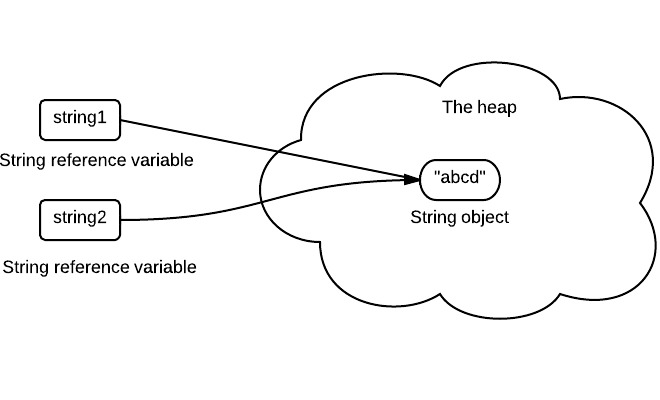Why Are Strings Immutable in Java? Insights right into Memory Performance
Why Are Strings Immutable in Java? Insights right into Memory Performance
Blog Article
What Is Immutable Strings and Just How It Works
In the world of shows, understanding the principle of unalterable strings is critical for producing durable and protected applications. Immutable strings refer to strings that can not be altered after they are developed, making certain information honesty and predictability within the code.
The Basics of Unalterable Strings
Unalterable strings, as an essential idea in programs, are character series that can not be altered when they are created. This means that when a string is assigned a worth, that value can not be modified. In languages like Python and Java, strings are immutable items, leading to different implications in terms of memory management and data honesty.
One of the crucial advantages of immutable strings is that they provide a complacency in data control. Given that the content of an immutable string can not be customized, it makes certain that the original information continues to be undamaged, minimizing the threat of unexpected changes throughout program implementation (Why are strings immutable in Java?). This residential or commercial property also simplifies debugging processes, as programmers can trust that as soon as a string is defined, its worth will not be unintentionally changed
When a new string is produced based on an existing one, instead than customizing the initial string, the new value is saved independently. On the whole, recognizing the basics of immutable strings is essential for grasping programs concepts and enhancing code efficiency.
Advantages of Immutable Strings
Structure upon the security and effectiveness advantages of immutable strings, their advantages include enhancing code reliability and simplifying simultaneous programming jobs. By being immutable, strings can not be modified after development, which removes the danger of unintentional changes in the data they store. This inherent immutability makes sure that once a string is created, its value remains constant throughout the program's execution, reducing the chances of insects triggered by unforeseen changes.
In addition, unalterable strings add to code dependability by making it much easier to reason concerning the state of a program. Given that strings can not be altered, programmers can trust that a string will always hold the same value, simplifying debugging and maintenance initiatives. This predictability results in much more secure and dependable codebases.

Execution in Programming Languages
Within different shows languages, the unification of unalterable strings is a fundamental element that impacts exactly how information is managed and adjusted within code structures. The application of immutable strings differs throughout different programs languages, with each language offering its own devices to support this idea.

On the other hand, languages like C and C++ do not have built-in assistance for immutable strings. Programmers in these languages must manually carry out immutability by imposing rules within their code to prevent direct adjustments to string objects.
Ideal Practices for Dealing With Unalterable Strings
When managing unalterable strings in programs languages like Java and Python, sticking to finest methods makes certain safe and secure and efficient data Visit This Link adjustment. Among the crucial best techniques is to use StringBuilder or StringBuffer as opposed to directly adjusting strings, specifically when dealing with considerable concatenation operations. These classes offer mutable options for string adjustment, aiding to prevent unnecessary memory appropriations and enhancing efficiency.
Another finest method is to utilize string interpolation or format functions provided by the language as opposed to manual concatenation. This not only enhances readability however additionally aids in avoiding common risks such as unintentional string adjustments. In addition, when functioning with sensitive data such as passwords or API tricks, it is critical to avoid saving them as ordinary text in unalterable strings. Using safe storage space systems like char ranges or specialized collections for taking care of sensitive information helps minimize security risks connected with unalterable strings.
Real-world Applications and Examples
Discovering functional executions of unalterable strings in various markets reveals their significant effect on data stability and system integrity. In the healthcare industry, immutable strings play an essential function in ensuring the protection and discretion of individual data. By stopping unauthorized modifications to sensitive details such as medical documents and prescriptions, immutable strings help maintain conformity with stringent privacy guidelines like HIPAA.
Financial organizations also benefit site web from the unalterable nature of strings to improve the safety of consumer information and purchase documents. Immutable strings aid stop fraudulence and unauthorized modifications to economic details, giving a durable protection versus cyber dangers and ensuring the trust fund and confidence of customers.

Final Thought
Ideal practices for functioning with unalterable strings consist of avoiding straight modifications and making use of approaches that return new string things. Real-world applications of unalterable strings include data security, caching, and string adjustment jobs.
Unalterable strings refer to strings that can not be altered after they are developed, making sure information stability and predictability within the code. When a new string is created based on an existing one, instead than modifying the initial string, the new value is saved individually.In languages like Java and Python, strings are immutable by default, indicating that when a string things is developed, its worth can not be changed - Why are strings immutable in Java?. Ideal methods for working with immutable strings include preventing direct modifications and making use of approaches that return new string objects. Real-world applications of immutable strings consist of information encryption, caching, and string adjustment jobs
Report this page